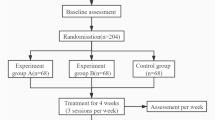Abstract
Objective
To observe the clinical efficacy of acupuncture plus turtle-shell-partitioned moxibustion in treating diarrheapredominant irritable bowel syndrome (IBS-D).
Methods
Seventy-six patients were randomized into two groups: 39 cases in the observation group were intervened by acupuncture plus turtle-shell-partitioned moxibustion, while 37 cases in the control group by the same acupuncture treatment, once a day, 10 d as a treatment course, for 2 courses in total. The improvements of symptoms were observed at the end of the intervention in both groups.
Results
The total effective rate was 89.7% in the observation group versus 67.6% in the control group, and the difference was statistically significant (P<0.05).
Conclusion
Acupuncture plus turtle-shell-partitioned moxibustion can significantly improve the symptoms of IBS-D, and can produce a more significant efficacy than acupuncture alone.
摘要
目的
观察针刺加隔鳖甲灸对腹泻型肠易激综合征(irritable bowel syndrome, IBS)的临床疗效。
方法
将76 例患者随机分为两组, 观察组39 例采用针刺加隔鳖甲灸治疗, 对照组37 例仅采用与观察组相同的针刺治疗。 两组均为每日1 次, 10 天为1 个疗程, 共治疗2 个疗程。治疗结束后观察两组患者治疗前后的临床症状改善情况。
结果
针刺结合隔鳖甲灸的总有效率为89.7%, 对照组为67.6%, 两组总有效率差异有统计学意义(P<0.05)。
结论
针刺加隔鳖甲灸可明显改善腹泻型IBS 的临床症状, 其疗效优于单纯针刺治疗。
Similar content being viewed by others
References
Xu XX, Li DG. Epidemiological feature of irritable bowel syndrome. Chin J Epidemiol, 2003, 24(6): 99–101.
Li Q, Feng F, Li Y, Li Q, Wu J. Recent epidemiological research status of irritable bowel syndrome. Hunan Zhongyi Zazhi, 2014, 30(3): 143–145.
Li H, Pei LX, Zhou JL, Sun JH. Comparative observation on therapeutic effects between acupuncture and Western medication for diarrhea-predominant irritable bowel syndrome. Zhonguo Zhen Jiu, 2012, 32(8): 679–682.
Qian HH, Zhu YP, Meng S, Qi GH, Zhao XX. Acupuncture treatment of diarrhea-predominant irritable bowel syndrome: a randomized controlled trial. Shijie Huaren Xiaohua Zazhi, 2011, 19(3): 257–261.
Drossman DA. The functional gastrointestinal disorders and the Rome III process. Gastroenterology, 2006, 130(5): 1377–390.
Specialty Committee of Digestive Diseases, China Association of Integrative Medicine. Consensus on irritable bowel syndrome by integrative medicine. Zhongguo Zhongxiyi Jiehe Zazhi, 2011, 31(5): 587–590.
Pang GS, Yao S, Tao K. Clinical experience of chief physician Tao Kun. Shanghai Zhenjiu Zazhi, 2008, 27(12): 1–2.
Wang W, Li RH. Impact of acupuncture Qihai and Guanyuan on anti-fatigue ability and some immune indexes in the mice lack of ‘qi’. JETCM, 2008, 17(10): 1433–1434.
Liu HR, Tan LY, Cui YH, Wu HG, Jiang B, Zhao TP, Wang XM. Regulating the secretion of insulin—like growth factor-? and transforming growth factor beta 1 of colonic fibroblasts by moxibustion at Tianshu and Qihai in rats. Zhongguo Zuzhi Gongcheng Yanjiu Yu Linchuang Kangfu, 2007, 11(49): 9878–9880.
Chu HR, Wang ZH, Yang J, Kong HB, Li F. Observation on therapeutic effect of pecking moxibustion of specific acupoints for treatment of irritable bowel syndrome (diarrhea type). Zhonguo Zhen Jiu, 2009, 29(2): 111–113.
Xin Q, Du DQ, Ma YX, Wang ZL, Gao SZ, Wang XY. Herb-partitioned moxibustion on Sheque (CV 8) for treating irritable bowel syndrome of spleen deficiency. Shanghai Zhenjiu Zazhi, 2011, 30(8): 517–519.
Zeng YH, Bao YH, Chu JM, Li HY, Zhu GX, Zhang WZ. Effect of moxibustion on diarrhea-dominant irritable bowel syndrome patients in dog days. Zhonghua Zhongyiyao Xuekan, 2010, 28(8): 1774–1776.
Liu XX. Moxibustion on Shenque (CV 8) improves effect of acupuncture for diarrhea-predominant irritable bowel syndrome. J Acupunct Tuina Sci, 2014, 12(6): 362–365.
Jiang XM. The clinical research of treatment of moxibustion in irritable bowel syndrome and the influence of the quality of life. Master Thesis of Nanjing University of Chinese Medicine, 2012.
Author information
Authors and Affiliations
Corresponding author
Rights and permissions
About this article
Cite this article
Pang, Gs., Chen, Zl. Therapeutic observation of acupuncture plus turtle-shell-partitioned moxibustion for diarrhea-predominant irritable bowel syndrome. J. Acupunct. Tuina. Sci. 14, 22–25 (2016). https://doi.org/10.1007/s11726-016-0895-5
Received:
Accepted:
Published:
Issue Date:
DOI: https://doi.org/10.1007/s11726-016-0895-5
Keywords
- Acupuncture-moxibustion Therapy
- Acupuncture Therapy
- Moxibustion Therapy
- Indirect Moxibustion
- Diarrhea
- Irritable Bowel Syndrome




